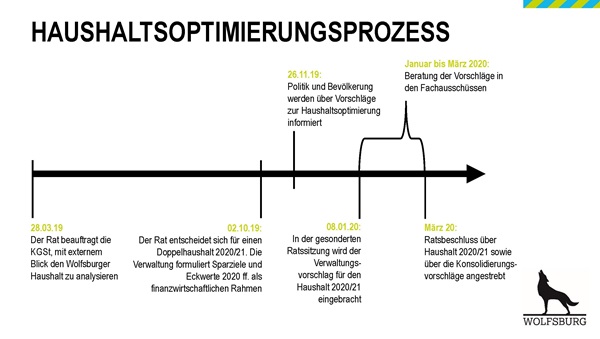Budget of the City of Wolfsburg
-
The current budget
Part 1: The plan
- Budget statutes
- Financial plan
- Preliminary report
- Net control operations
- Staffing plan
Part 2: Table section
- Sub-budgets with investment program
Part 3: Investment report
- Investment report for the 2023 financial year
Investments and key figures
- Key figures 2023
- Key figure profiles
-
Development of the budget situation in recent years
Very high income
After the difficult economic situation from 2008 to 2010, the local economy is prospering again. Wolfsburg becomes the most dynamic city in Germany and has to meet the growing population and the demands of an international business location. Thanks to high trade tax revenues, there are record budgets (e.g. 2014: EUR 474 million), which include important investments in residential areas, transport routes, daycare centers, schools and leisure facilities. In addition, reserves can be built up for bad times. The city is one of the few debt-free municipalities in Germany. However, the high level of investment is almost impossible to work off in the short time available.
Trade tax shortfalls
As early as 2014, it became apparent that the level of trade tax income would not be sustainable. In September 2015, it became known that Wolfsburg would have to make do with significantly less trade tax in the medium term. The city reacted immediately with a hiring freeze and a budget freeze to await further developments.
Austerity budgets
Wolfsburg must make savings: Ongoing costs are being reduced, investments that are not urgently needed are being cut back or postponed to the future program. Despite the lower income, the city is also preparing for the future: Further investments are being made in important areas such as education, housing, mobility and digitalization. Started (construction) projects will be continued. Due to new laws, the city must also implement additional tasks. Budget deficits can still be offset by financial reserves from previous years.
Reserves used up
There is still no improvement in sight; the 2019 budget is planned with a deficit for the fifth year in a row. The savings have been used up, the city is partly living on credit or can only theoretically balance the deficits (via the overall balance sheet). Structures, tasks and processes are to be put to the test, as the city will have to make do with less money in future.
Budget optimization
In addition to the internal savings efforts, the external analysis shows where further savings potential lies. One thing is clear: the savings will entail many changes that will be felt directly by everyone in the city. Investments in the future viability of the city will be maintained (childcare, expansion/conversion of schools, housing offensive, mobility, digitalization, security).
Well positioned for the long term
In the second step, the city administration intends to modernize itself from 2020. Modern forms of organization and the opportunities offered by digitalization should make the city administration even more citizen-friendly and efficient. This will enable the city to remain a top business location with a high quality of life, dynamism and excellent future prospects, even with less revenue.
-
Current financial position
Development of the ordinary result
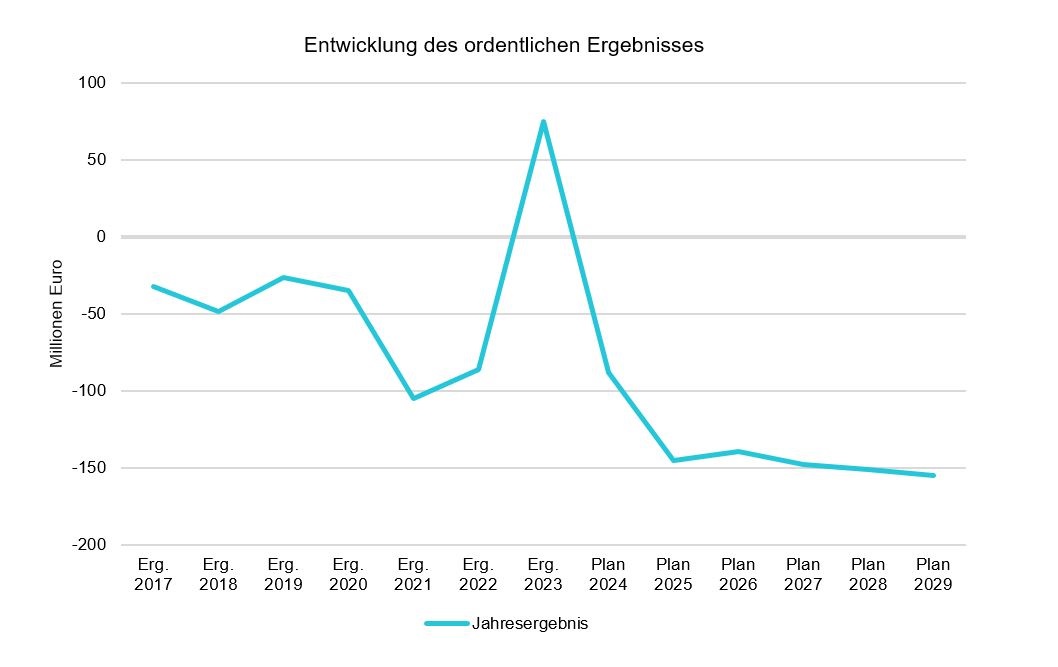
Development of payments for investments
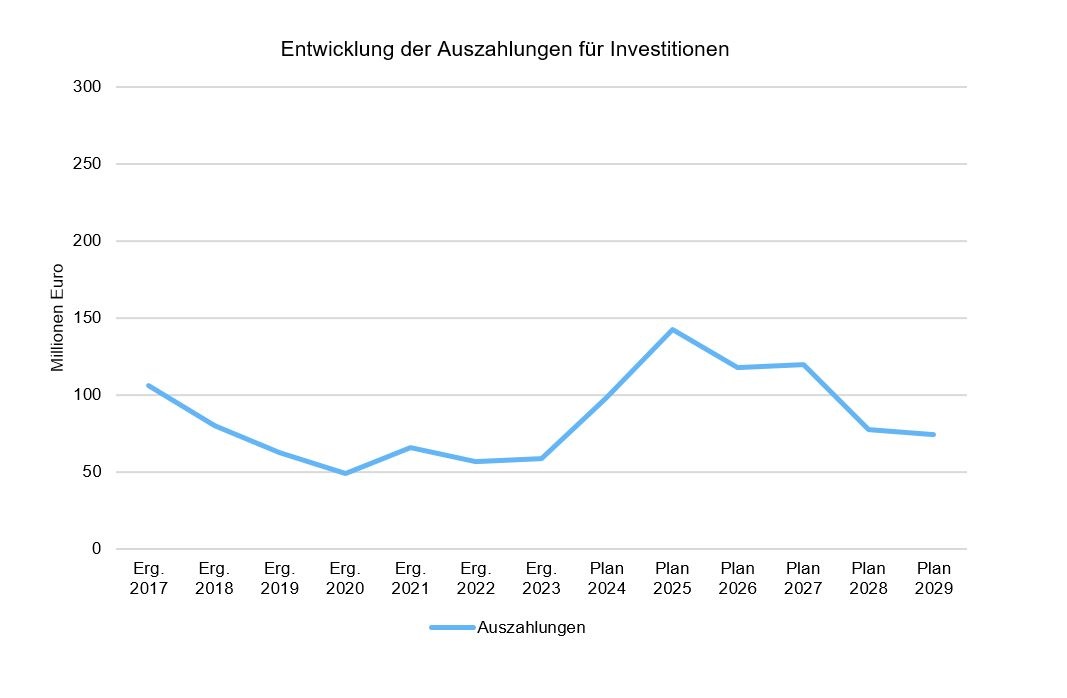
Development of the level of debt for investments
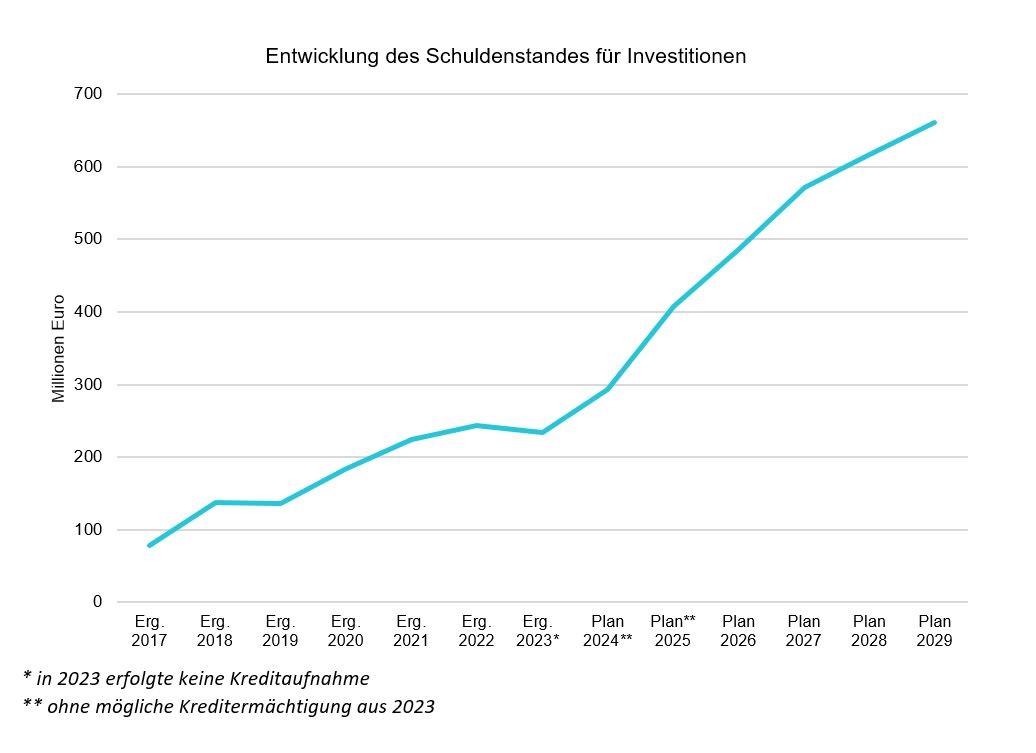
Development of material taxes and benefits
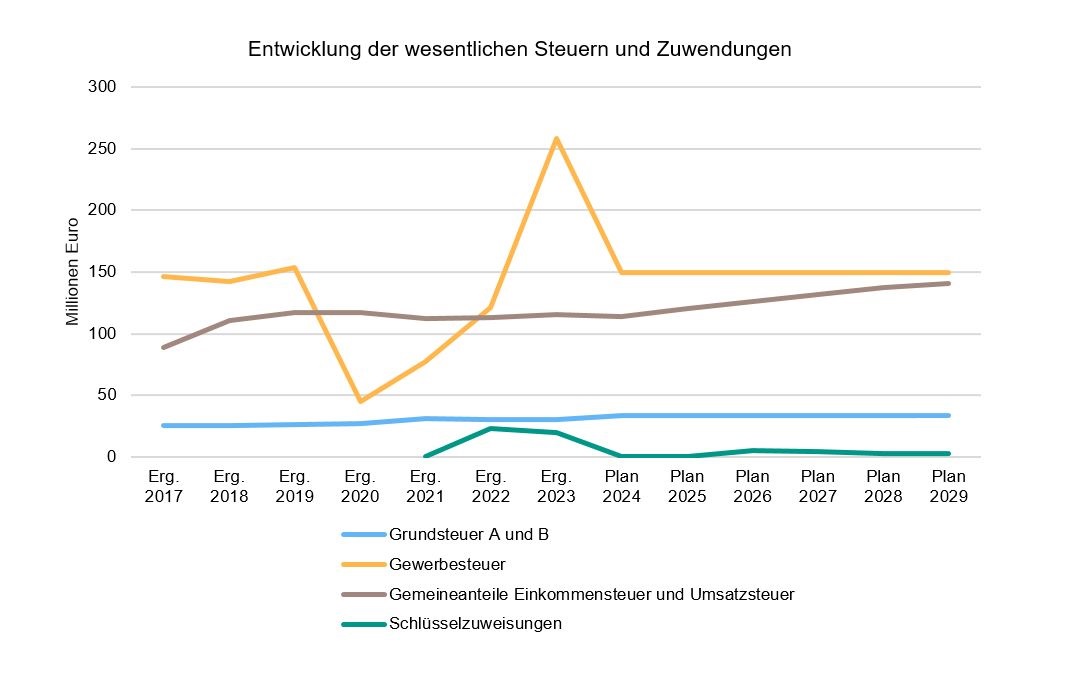
Investment program by focus areas
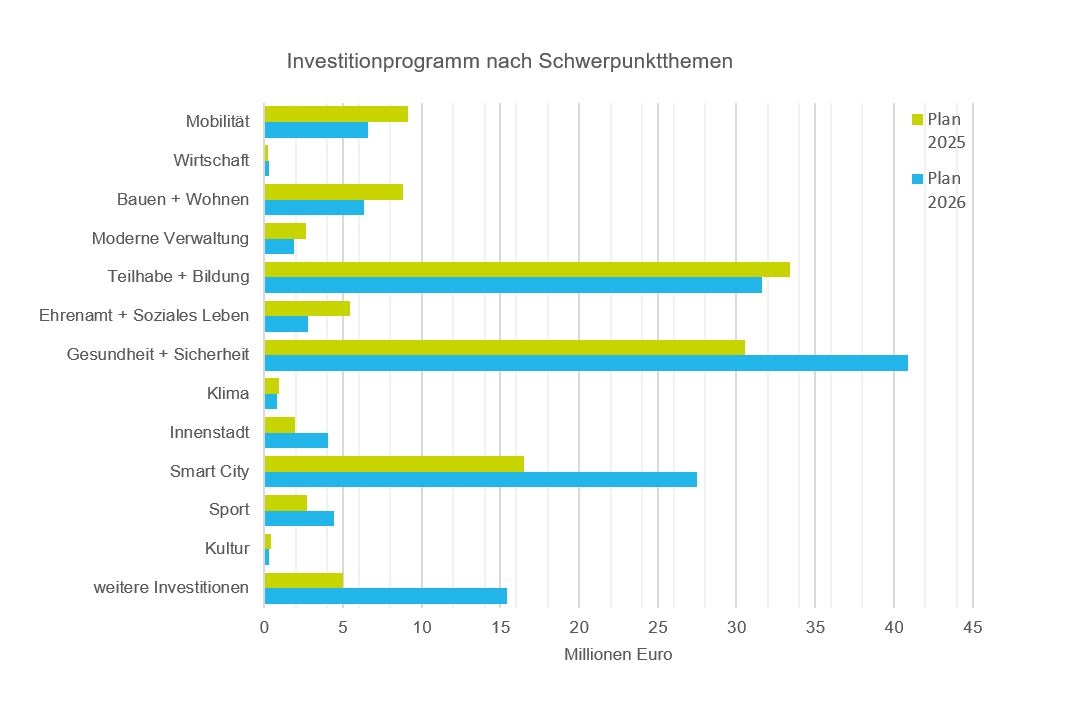
-
Citizen suggestions
The suggestions made by citizens for optimizing the budget of the city of Wolfsburg were published anonymously. This enabled them to be included in the political discussion in time for the start of the budget deliberations. The citizens' ideas could be submitted until the beginning of January. A total of 61 suggestions were recorded in writing, by telephone, by e-mail, at the "Talking to Mohrs" event and via the Stadtjugendring (City Youth Council), which were accompanied by comments. The list of suggestions is now available for download here.
"The participation of our citizenry is very important to us. Therefore, it was always out of the question for us to also involve the citizens of Wolfsburg on the important topic of budget optimization and to ask them to submit savings proposals. We would therefore like to thank all citizens for their commitment," said City Councilor Iris Bothe.
-
Budget brochure
How has the municipal budget developed in recent years?
-
Archive
-
How does the budget optimization process work?
On March 28, 2019, the Council decided to commission the Kommunale Gemeinschaftsstelle für Verwaltungsmanagement (KGSt), based on its expertise from other municipalities, to put structures, tasks and processes to the test with an external view. It was to highlight where there was potential for savings over and above what had already been achieved. These were presented to the public for the first time at the end of November. The joint task of the city administration and politicians was to discuss them by the spring of 2020 and finally select from the proposals received those to be implemented. In 2020, 10 to 15 million euros must be saved, followed by a further 10 to 25 million euros, so that a total annual savings volume of 25 to 30 million euros must be achieved.
-
The KGSt overall proposal list
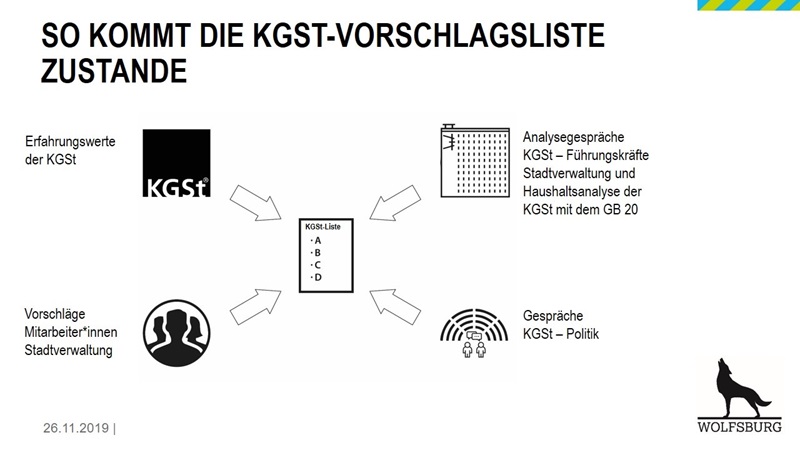
At the end of September 2019, KGSt presented the City of Wolfsburg with an overall list of proposals for the budget optimization process and initial ideas for administrative modernization.
-
The management package
The KGSt's overall list of proposals was discussed by the administrative board, consisting of the mayor and the five department heads, according to the following criteria:
- Effect on the budget
- Economic responsibility and optimized processes
- balanced distribution
- Feedback to the business units
- Consideration of long-term consequences on
- future of the city
- City as an attractive employer
The administrative package is the result.
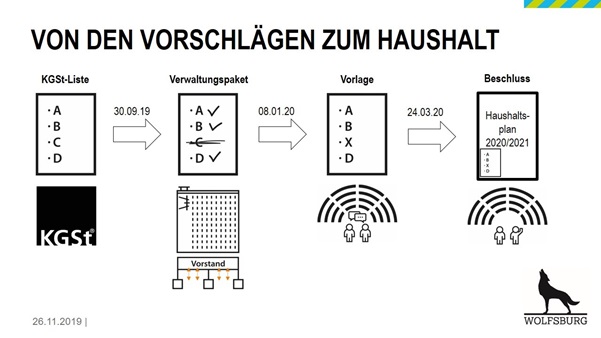
In the course of budget optimization, KGSt identified initial potential for administrative modernization. This is summarized in the list "Interim status of administrative modernization".
-
Citizen participation
Citizens can send their ideas and suggestions by e-mail to mitwirkung@stadt.wolfsburg.de. Suggestions will be collected until the introduction of the council bill at the beginning of January 2020 and then checked for feasibility and, if necessary, introduced into the political process. The citizens' suggestions will be published on the municipal website wolfsburg.de from the end of January. Until the planned budget adoption at the end of March 2020, citizens can also contact their elected council representatives and make their views known. The optimization of the budget will not be completed with the council's decision at the end of March, but will have to be an ongoing process so that citizens' suggestions continue to flow in.
-
Advice to political bodies
Analogous to the budget discussion, the package of proposals of the administration was brought to the council meeting on 08.01.2020 with a presentation to the council. In January 2020, KGSt presented the results of the analysis of the municipal subsidiaries. This was followed by the specialist committee consultation. On 24.03.2020, the optimization package was adopted by the Council with the 2020/2021 double budget.
2024
- Budget 2024 - Part 1 - The plan
- Budget 2024 - Part 2 - Table section
- Budget 2024 - Part 3 - Investment report
2023
- Budget 2023 - Part 1 - The plan (corrected version)
- Budget 2023 - Part 2 - Table section/Investment program
- Budget 2023 - Part 3 - Participation report
2022
- Budget 2022 - Part 1 - The plan
- Budget 2022 - Part 2 -Table section/Investment program
- Budget 2022 - Part 3 - Participation report
2020/2021
- 1st supplement to the 2020/2021 budget - Part 1
- 1st supplement to the 2020/2021 budget - Part 2
- Budget 2020/2021 - Volume 1
- Budget 2020/2021 - Volume 2 - Investment program
- Budget 2020 - Volume 3 - Participation report
- Budget 2020/2021 - Volume 3 - Participation report
2019
- Budget 2019 - Volume 1
- Budget 2019 - Volume 2 - Investment program
- Budget 2019 - Volume 3 - Participation report
- 1st supplementary budget of the city of Wolfsburg
2018
2017
- Budget 2017 - Volume 1
- Budget 2017 - Volume 2 Investment program
- Budget 2017 - Volume 3 - Charts
- Budget 2017 - Volume 4 - Participation report
- Annual financial statements 2017
2016
- Budget 2016 - Volume 1
- Budget 2016 - Volume 2 - Investment program
- Budget 2016 - Volume 3 - Charts
- Budget 2016 - Volume 4 - Participation report
- Annual financial statements 2016
2015
- 1st supplementary budget of the city of Wolfsburg
- 2nd supplementary budget of the City of Wolfsburg
- Budget 2015 - Volume 1
- Budget 2015 - Volume 2 - Investment program
- Budget 2015 - Volume 3 - Charts
- Budget 2015 - Volume 4 - Participation report
- Annual financial statements 2015
2014
- Budget 2014 - Volume 1
- Budget 2014 - Volume 2 -Investment program
- Budget 2014 - Volume 3 - Charts
- Budget 2014 - Volume 4 - Participation report
- Annual financial statements 2014
2013
- 1st supplementary budget of the city of Wolfsburg
- 2nd supplementary budget of the City of Wolfsburg
- Budget 2013 - Volume 1
- Budget 2013 - Volume 2 - Investment program
- Budget 2013 - Volume 3 - Charts
- Budget 2013 - Volume 4 - Participation report
- Annual financial statements 2013
2012
- Budget 2012 - Volume 1
- Budget 2012 - Volume 2 - Investment program
- Budget 2012 - Volume 3 - Charts
- Budget 2012 - Volume 4 - Participation report
- Annual financial statements 2012
2011
- Budget 2011 - Volume 1
- Budget 2011 - Volume 2 - Investment program
- Budget 2011 - Volume 3 - Charts
- Budget 2011 - Volume 4 - Participation report
- Annual financial statements 2011
2010
2009
-
How does the budget optimization process work?
-
Contact
City of Wolfsburg
Finance Division
Porschestrasse 49
38440 WolfsburgPhone: 05361 28-2124
Fax: 05361 28-2758
E-mail: sekretariat.finanzen@stadt.wolfsburg.de

